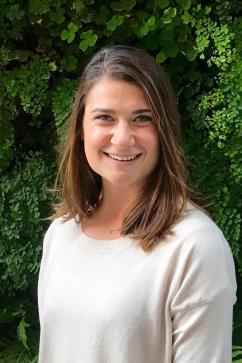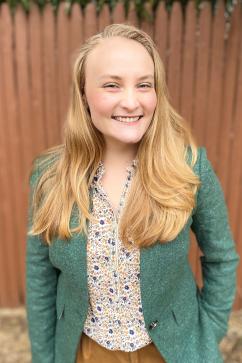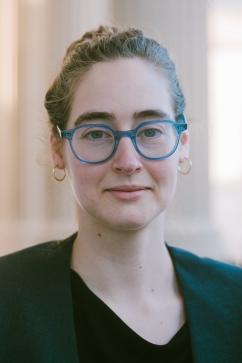
Three Yale students — Annie Miller ’23 MEM, Molly Ryan ’23 MEM, and Jane Jacoby ’24 MF/JD — have been named 2022 Wyss Scholars, a program that supports the graduate-level education of a new generation of leaders in U.S. land conservation.
The prestigious program is sponsored by the Wyss Foundation, a charitable organization that supports land conservation in the U.S. and internationally. The students will receive tuition, internships, and post-graduate support as part of the program.
“For more than a century, our School has been thoroughly engaged in the complex conservation issues facing communities across the U.S.,” says Indy Burke, Carl W. Knobloch, Jr. Dean of the Yale School of the Environment. “Because of the generous support of the Wyss Foundation, we can continue to train and empower emerging leaders who carry deep personal connections to the land and who are committed to solving environmental challenges in ways that are innovative, sustainable, and equitable.”

Growing up at the base of the Sierra Nevada Mountains in Carson City, Nevada, Miller has always held an affinity for the outdoors, initially pursuing a career in ecology and conservation biology research. As an undergraduate at Tufts University, she completed an independent study that investigated the habitat requirements of an endangered waterbird and contributing to a wetland management plan in an area degraded by development and the effects of climate change.
This work, however, revealed a disconnect between her ecological research and the need for more inclusive, applied work. “A growing part of me felt like my future in academia lacked the community-based perspective and application I believed necessary to effect significant change,” says Miller.
In the four years before graduate school, Miller shifted gears to a National Science Foundation-funded research project that studied how and what young people learn when engaged in biodiversity-focused citizen science programming. Working for the Citizen Science Department at the California Academy of the Sciences, she helped build and maintain partnerships with community-based organizations to build local, place-based nature connection and collected data to inform local land management.
Miller’s YSE studies center on biodiversity and land conservation in the American West, with particular focus on how community-based, collaborative land management strategies can improve conservation outcomes and human livelihoods. She is a research assistant for the Ucross High Plains Stewardship Initiative, where she works with an agricultural land trust to develop a restoration fund for ranchers implementing conservation-based projects on their working lands.

A native of Arizona, Ryan had the opportunity to learn about environmental stewardship through an organization, Grand Canyon Youth, which partners with the U.S. Geological Survey. She participated in citizen science projects, monitoring endangered fish species and their food source along the Colorado River — an experience that changed the trajectory of her academic and professional career.
“I’d always had access to this place, but being invited to learn about the canyon’s ecosystem in a hands-on, participatory way was groundbreaking,” says Ryan. “I felt included, invested, and inspired. I knew I wanted to bring this experience to others, ensuring that they could engage directly with their environment in the same way.”
She attended Dartmouth College before working with Resource Systems Group, where she conducted visitor use management projects to help the National Park Service understand visitors’ experiences and use patterns around the country. Those recommendations have helped inform NPS policies and practices regarding visitor estimation procedures, transportation investments, and the protection of natural resources, cultural resources, and visitors’ experiences.
At YSE, Ryan is focusing on the social aspects of land conservation and management, with particular interest in increasing access to public lands through inclusive community collaboration, stewardship, and environmental communication. She is a research assistant with UHPSI, conducting a project on the communication strategies of environmental NGOs in Western towns experiencing rural gentrification.

Jacoby began her life far from the U.S. West — she grew up in New York City and attended Brown University. After college, however, she took a job with AmeriCorps where she experienced the connections between land conservation and sustainability, from digging trails in Colorado to aiding in hurricane disaster relief in Texas.
“My work in Texas took me from neighborhood to neighborhood,” recalls Jacoby. “These trips made obvious how much worse the storm hit low-income, immigrant communities living alongside oil refineries than white, wealthy communities surrounded by native marshes and bayous.”
She then went on to work as a conservation director for a community nonprofit in rural Montana, the Yaak Valley Forest Council, where she oversaw ecosystem-stewardship activities aimed at preserving the Northwest Montana valley as a climate refuge. Experiencing the overlap of race, class and environmental law in land conservation issues compelled Jacoby to attend Yale Law School, where she is a teaching fellow of the Environmental Protection clinic and co-chairs the Yale Environmental Law Association.
“My goal is to support community-led land management for more equitable climate mitigation,” she says.
This summer, Jacoby will serve as a law clerk with a San Francisco-based firm that represents state and local governments in high-impact environmental law cases, and will begin pursuing a master’s degree in forestry at YSE in the fall.
Published
April 20, 2022